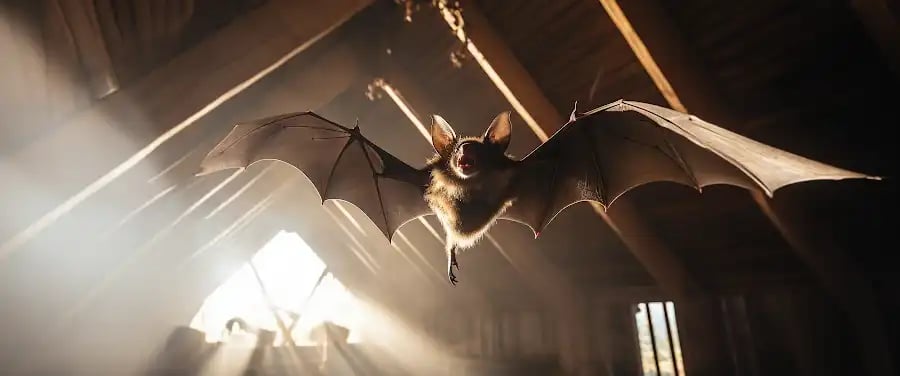
Do you remember hearing that mysterious scratching sound at night from deep within your walls? Rollercoaster feelings of curiosity followed by dread are certainly not the ideal way to wrap up your day. Maybe you’ve also noticed peculiar little droppings in a corner or small bite marks on your favorite foods in the pantry. You’re most likely dealing with a rodent problem that could prove to be far more troublesome than you’d ever imagined.
Rodents – those tiny, scurrying villains. They’re practically the perfect tiny, hidden criminals, and they can leave behind astonishing levels of destruction in your home. Rodent damage goes far beyond gnawing your beloved stuff. They can turn your house upside down and damage it in many shocking ways that are not just limited to physical destruction. These home invaders can pose serious threats to your health, property safety, and your pocket.
As unwelcome as it is, the reality is that our warm, cozy homes are an absolute paradise for these creatures, especially when the fall chill sets in. Now that you’ve started suspecting these “unseen” culprits might have infested your personal space, it’s high time to peel back the layers and expose the hidden damage these pests can cause. Surely, you’ll agree that understanding the extent of potential harm caused by these pests can be an eye-opening starting point to devising a strong action plan. So, ready to dive in and find out what makes these creatures the true “home wreckers?” Brace yourself – it’s time to talk about “What Types of Rodents Commonly Infest Homes?”.
How Do Rodents Make Their Way into Homes?

Just as you enjoy the warmth and safety of your home, so do rodents. Critters, like mice and rats, often invade residential areas looking for food sources and shelter, causing havoc as well as potential damage. Understanding the tricks behind their unwelcome invasions can help you keep them at bay.
One of the primary reasons why rodents make a beeline for your home is attributable to their unabated search for food. Various foods, especially those not stored properly, often make a tasty treat for these agile creatures feeding off the crumbs you unknowingly drop or from open bins. Strangely enough, our neglect toward disposing of leftovers and maintaining cleanliness can sometimes act as a hearty invitation for these rodents.
Another factor that encourages rodent intrusion is the seek for shelter. These critters are always looking for a cozy, safe haven where they can breed and hibernate. The small crevices and warm attics of your home can seem awfully inviting to these uninvited guests, offering them the perfect hideaway from predators and harsh weather conditions.
Lastly, the gap in your home’s construction or fortification is another golden ticket for these pests. Any weak points in structures, like cracks in walls and openings near pipes and vents, provide convenient entry points for rodents to sneak in.
To summarize, these are the common ways rodents invade your homes:
- Search for food sources.
- Need for shelter.
- Exploitation of weak points in construction.
Additionally, let’s look at a table displaying specific items and areas in your home that can attract rodents
| Attractive Item/Area | Reasons Attractive to Rodents |
|---|---|
| Open Food Containers | Ideal food sources |
| Garbage Bins | Easy access to food waste |
| Poorly Stowed Pet Food | Inviting food source |
| Attics and Basements | Secluded shelter |
| Cracks and Crevices | Easy entry points |
| Nearby Shrubs and Trees | Offer shelter and climbable access to your home |
Rodents are a delicate issue that need effective handling. Their destructive capabilities extend beyond mere annoyance to potential property damage and health hazards. To avoid such circumstances, keep a watchful eye on the possible rodent entry points, food sources and what you might unintentionally be doing to invite a home infestation.
Now, let’s perennially shift our lens to understanding precisely what types of property damage these rodents can lead to when left unchecked.
What Types of Property Damage Can Rodents Cause?

When we think of rodents, we often picture minor nuisances. But the truth is, these tiny critters can create a ton of damage to your home, and in more ways than you might imagine.
Damage to Building Structures
Often out of sight, rodents can be hard at work, gnawing on your home’s structural elements like wood and drywall giving rise to serious structural damage. Fanciers of warm and cozy spots, these pests frequently make rodent nesting places out of your home’s insulation materials. Not only does this wreak havoc on your home’s heating and cooling efficiency, but it also leads to the unpleasant issue of areas soiled with rodent urine and feces, tarnishing the cleanliness and hygiene of your residence.
Damage to Electrical Systems
Rodents and electrical systems are a dangerous duo. Rodents, especially rats, have a tendency for rodent chewing on anything and everything, including electrical wires and cables. The damage they cause to the electrical systems isn’t just about inconvenience. It also presents potential fire risks, posing a serious threat to your family’s safety.
Damage to Electrical Systems
Imagine finding your stylish clothing, treasured books, and other household items shredded to bits. Rodents are not picky about what they gnaw on, resulting in personal property damage. Further, they often venture into food supplies, contaminating them and leading to further losses. Destruction and contamination by rodents turn your beloved household items into chew toys and cause the loss of useable supplies, exacerbating the economic impact of an infestation.
To give you an idea of the average costs and types of damage associated with rodent infestations, have a look at the following table:
| Type of Rodent Damage | Average Repair Cost |
|---|---|
| Structural Damage (drywall, wood) | $200 – $1,000+ USD |
| Electrical System Damage | $1,500+ USD |
| Insulation Damage | $1,000+ USD |
| Personal Belonging Damage | Varies (depending on the value of destroyed items) |
In conclusion, rodents are more than mere nuisances – they are potential wrecking balls capable of causing significant property damage. On top of this, there’s the associated health risks to consider. But that’s a topic for our next discussion – ‘ What Are the Health Risks Associated with Rodent Infestations?’ The antics of these critters certainly solidify the fact that the phrase “quiet as a mouse” isn’t as harmless as it sounds!
What Are the Health Risks Associated with Rodent Infestations?

When you hear a little scamper in the attic or notice chewed wires and tiny droppings lying around your premises, it’s often an unwelcome sign that rodents, such as rats and mice, have set up shop in your property. Besides being unpleasant houseguests, they pose a significant threat to your health and well-being. But exactly how impactful can these tiny critters be? As it turns out, that damage can be quite substantial.
The Deadly Spread of Diseases
Rodents are notorious carriers of various dangerous diseases, which can be easily transmitted to humans. One notable example is Hantavirus Pulmonary Syndrome, a severe, sometimes fatal, respiratory disease spread mainly by rodent droppings. According to the Center for Disease Control and Prevention (CDC), cases of Hantavirus have been reported in the United States, predominantly in the western and southwestern regions.
Other notable diseases disseminated by rodents are Rat-bite fever, Salmonella, and Leptospirosis. These illnesses usually present with flu-like symptoms, including fever, vomiting, and headaches. More severe cases may result in organ failure or death if not treated swiftly and correctly.
Allergic Reactions and Asthma
The dander (dead skin flakes) and droppings from rodents are potent allergens. They trigger allergic reactions and can exacerbate asthma, especially in sensitive individuals. Prolonged exposure to these allergens may lead to persistent coughing, sneezing, and difficulty in breathing.
Mental Stress and Anxiety
A rodent infestation can lead to mental stress and anxiety. The constant fear of diseases, property damage, and the stigma that comes with having rodents in your home can weigh heavily on your mental health.
So, next time you hear a rustle in the attic or spot a chewed wire, it might be time to take action. Rodent infestations are not to be scoffed at – they pose real, significant health risks, and carry diseases that should not be taken lightly. Don’t forget the potential for allergic reactions and the mental stress that these unwanted guests can bring.
Without proper handling, a small infestation can transform into a widespread hazard, threatening your family’s health and your home’s structure.
Coming up next: a guide on how to recognize a rodent infestation in your home. You won’t want to miss this!
How Can You Tell If You Have a Rodent Infestation?
Imagine this. It’s quiet in your house, almost too quiet. Suddenly, you hear the sound of tiny feet running around in the attic or within the walls. Then, you see small, oval droppings, or worse, a damp spot where some rodent urine was detected. And, that’s when you realize – you’ve got a rodent infestation! But, how can you really be sure?
Many homeowners only start suspecting a rat or mouse problem when it’s already too late. The silent raiders of your home often leave behind telltale signs of their presence, so knowing these rodent infestation signs can save you a whole heap of trouble down the line.
Unmasking The Culprits: Detection of Rodent Droppings and Urine
Rodents are notorious carriers of various dangerous diseases, which can be easily transmitted to humans. One notable example is Hantavirus Pulmonary Syndrome, a severe, sometimes fatal, respiratory disease spread mainly by rodent droppings. According to the Center for Disease Control and Prevention (CDC), cases of Hantavirus have been reported in the United States, predominantly in the western and southwestern regions.
Other notable diseases disseminated by rodents are Rat-bite fever, Salmonella, and Leptospirosis. These illnesses usually present with flu-like symptoms, including fever, vomiting, and headaches. More severe cases may result in organ failure or death if not treated swiftly and correctly.
Are You Hearing Things? Unusual Noises in the Walls or Attic
Small scratching noises, the sound of tiny feet scurrying across the floor or ceiling, or even muffled squeaks are another classic symptom of a rodent infestation. These unusual noises might not be so unusual after all, especially at night when rodents are most active.
To complement your own investigations, you might want to consult professional pest control services to ensure you’re not missing any signs. The Centers for Disease Control and Prevention (CDC) has cited that rodents in homes can lead to numerous health hazards, further emphasizing the importance of accurate detection.
Overall, being aware of these signs can help you prevent the furry invaders from causing major harm to your property. Ensuring swift detection and effective prevention methods is key to securing your home from the often overlooked perils of rodent infestations. Remember, these unwanted guests might be small, but their potential to harm your property is not to be underestimated.
Mental Stress and Anxiety
Small scratching noises, the sound of tiny feet scurrying across the floor or ceiling, or even muffled squeaks are another classic symptom of a rodent infestation. These unusual noises might not be so unusual after all, especially at night when rodents are most active.
To complement your own investigations, you might want to consult professional pest control services to ensure you’re not missing any signs. The Centers for Disease Control and Prevention (CDC) has cited that rodents in homes can lead to numerous health hazards, further emphasizing the importance of accurate detection.
Overall, being aware of these signs can help you prevent the furry invaders from causing major harm to your property. Ensuring swift detection and effective prevention methods is key to securing your home from the often overlooked perils of rodent infestations. Remember, these unwanted guests might be small, but their potential to harm your property is not to be underestimated.
Conclusion
Despite their tiny size, rodents can lead to gigantic problems in your home. They don’t just cause minor nuisances; these little creatures are capable of inflicting serious damage to your property. An infestation can eat away at your peace of mind, wallet, and worst of all, your beloved home. It is essential to understand not only the damage that rodents can cause but also how to prevent or control an infestation from wreaking havoc on your property.
Rodents, especially rats and mice, have teeth that never stop growing, compelling them to gnaw incessantly. This destructive habit can cause harm to nearly every part of your house. Wooden structures are particularly at risk, including furniture and supporting beams. Imagine the catastrophic aftermath if a rodent gnaws through essential support structures – your home’s integrity could literally crumble.
Our furry invaders don’t stop at just the wood. Pipes, both plastic and copper, cannot withstand the onslaught of constant gnawing. Leaky pipes can, in turn, lead to water damage, a type of destruction that is often expensive or infeasible to repair.
Moreover, rodents also have an appetite for electrical wiring, leading to a potential fire hazard and costly rewiring efforts. In fact, it is estimated that rodents are responsible for up to 25% of house fires in the US in which the cause isn’t determined.
Beyond the structural damage, rodents pose a risk to your health too. Their droppings often carry diseases, like hantavirus, salmonellosis, and bubonic plague, which can infect human beings and pets. Their shedding fur and skin can also trigger allergies or asthma in some individuals.
Despite the alarming damage rodents can cause, prevention and control measures are within reach. Keeping your home clean and areas where food is stored secure will discourage rodents. Sealing any small holes or cracks in your home can also prevent rodents from finding a way in. Trapping and poison are common control methods if you already have an infestation. Hiring pest control experts is also an option if the situation becomes too overwhelming.
In conclusion, we cannot stress enough the importance of taking rodent infestations seriously. A rodent-free home is not just more comfortable; it is safer, healthier, and structurally sound. Remember, staying informed about the potential damage and control measures is the key to preventing rodents from becoming unwanted guests in your home. The benefits of a rodent-free home resonate across the health of your family, the integrity of your house, and your peace of mind.
| Associated Cost | Associated Cost | Prevention |
|---|---|---|
| Structure Damage | $1,000 – $3,000 | Seal cracks/holes |
| Plumbing Damage | $200 – $5,000 | Regular inspections |
| Electrical Damage | $150 – $350 | Use rodent-resistant materials |
| Disease Transmission | Medical Costs | Maintain cleanliness |



